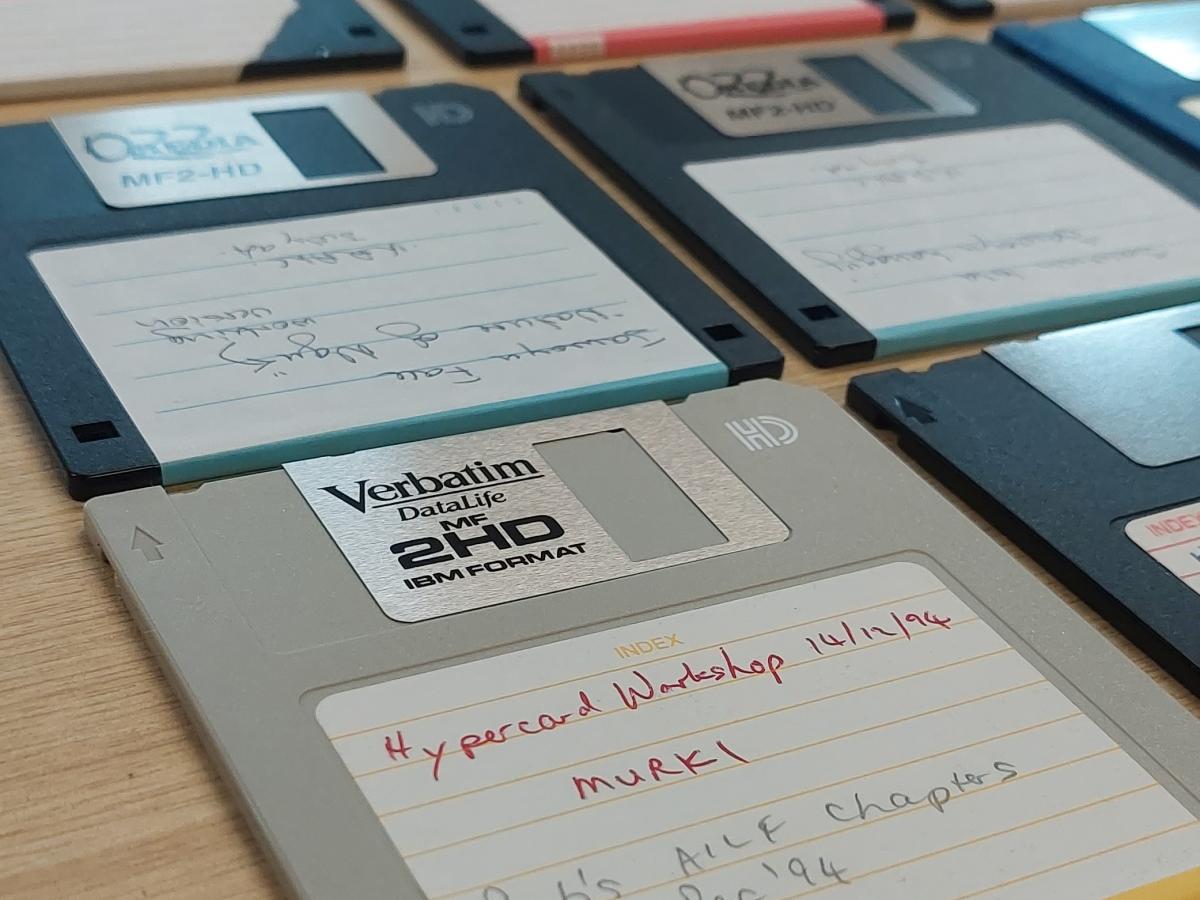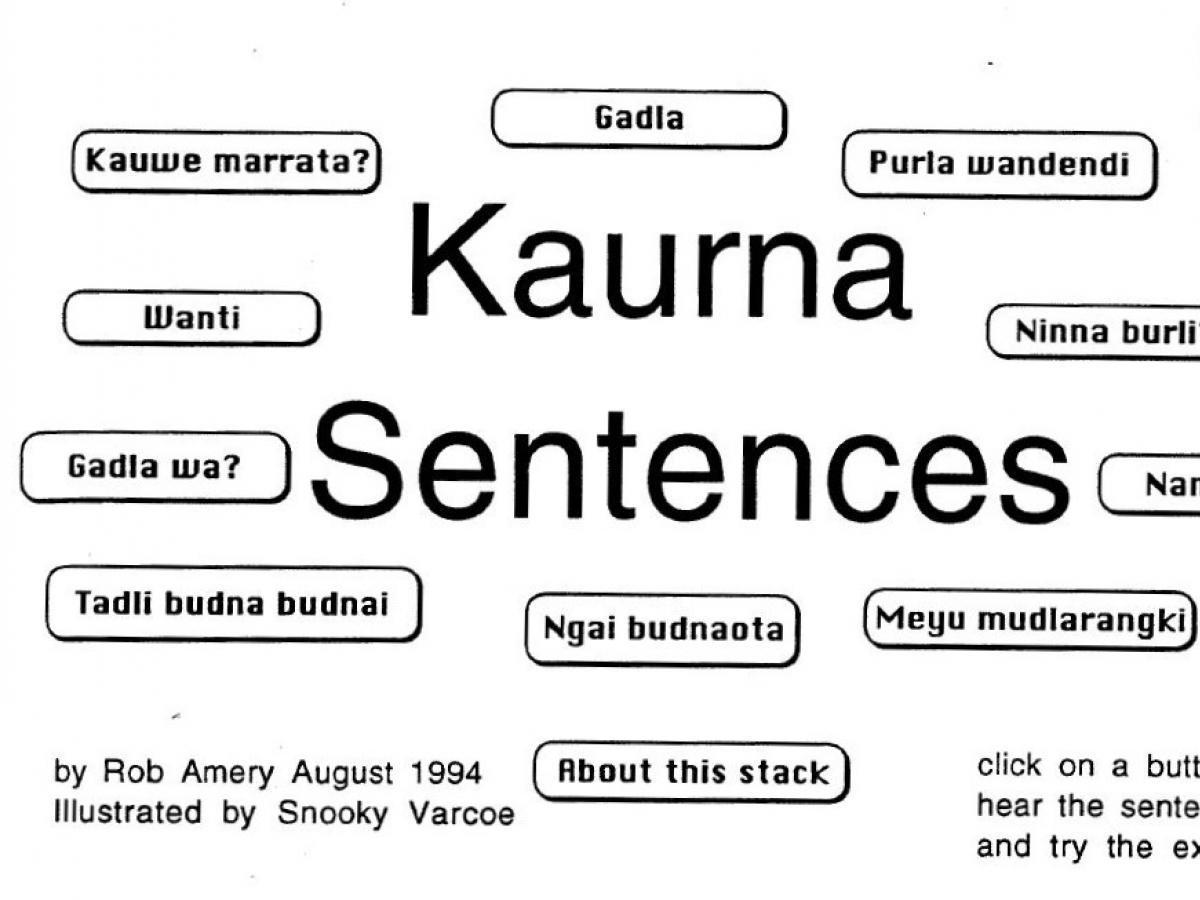World Digital Preservation Day

The original Hypercard files are on a series of floppy disks.
Our University Library collections include far more than just books on shelves. As well as the physical and online research and teaching collections, we care for a wide range of unique collections, such as theses, University records, research data, and manuscript collections. Most of today’s publication and research is done digitally, so the Library needs to think in new ways about our traditional business. While transitioning from paper to pdfs might be challenging, recent decades have thrown up even trickier questions, including how to look after audio and video recordings, obsolete media, and unusual digital formats.
In recent weeks we’ve started working with Associate Professor Rob Amery and Susie Greenwood, with the support of Kaurna Warra Karrpanthi, on the preservation of a Kaurna language archive.
For more than three decades a community of Indigenous and non-Indigenous collaborators has been working to reclaim and teach Kaurna language, using nineteenth century records held in local libraries and archives as a key source. When they started in 1989, Kaurna language was considered at risk of extinction - no known fluent speakers remained, there were no recorded sources, and Kaurna people, including some that regularly used parts of the language, were dispersed widely across the Adelaide metropolitan and surrounding areas. This work has resulted in a rich collection of language, cultural and learning material, including historical documentation, teaching resources, film footage, audio cassettes, reel to reel tapes, reports, photos, and other ephemera.

Kaurna Sentences menu, users can navigate to a selection of sentences from this card.
It also includes a 1994 computer game that Rob Amery made using Hypercard, an Apple software program that enabled the creation of a stack of virtual ‘cards’ and build links so that users can navigate from card to card. Hypercard had a flexible graphical interface, linked sound, text and pictures, and was easy to use. It was hugely popular, and used for many games and educational resources. It is now recognised as one of the first products to introduce people to ‘hypertext’ as a way of navigating around information, an early model of how the world went on to use the internet.
Rob was inspired by a similar initiative at AIATSIS, and saw the potential of this technology to help users hear unfamiliar language sounds associated with the written version of the word. His stacks based on sounds and spellings, and sentences taken from historical manuscripts were an exciting and flexible way for learners to interact with the material.
Fast forward to 2021, and the Library wants to preserve and provide access to this game. Our problem is that that Hypercard was discontinued in 2004, and we can’t even see the files using contemporary computers, let alone run the game.
We’re not alone in this challenge, which extends beyond Hypercard applications. In their annual report on the world’s digitally endangered species, the Digital Preservation Coalition list ‘Old or Non-current Video Games’ as critically endangered, pointing out that that they are often stored on old media, like floppy disks, and depend on obsolete operating systems.

‘Card’ from Kaurna Sentences. Players answer a multiple choice quiz based on sentences from an 1840 manuscript by missionaries Teichelmann and Schürmann. Illustration by Nelson ‘Snooky’ Varcoe.
Like computer aided design, some databases, and even older versions of Windows, these games will be lost unless we can access them on contemporary computers. Preservation specialists are working on emulation as one response to this challenge. This means creating an environment, either on your computer or online, that imitates another computer platform. Emulation aims to preserve the original behaviours, look and feel of the content, as well as accessing the content.
Organisations like the Australian Centre for Moving Image and the Internet Archive use emulation to preserve gaming heritage from the 1970s onwards, while the German National Library is using it to preserve digital artworks and scientific simulations.
We’ve just started experimenting with emulation, and the Kaurna Languages stack gives us a valuable opportunity to learn while preserving a significant multimedia object. We’ve retrieved the data from the floppy disks, itself a challenge requiring the use of digital forensic tools, and hope to get the stack up and running. We’re not there yet, but remain optimistic, as others have successfully retrieved AIATSIS’ Australia’s Languages Stack. You can explore it using the Internet Archive emulator here.
World Digital Preservation Day gives us an opportunity to share this as one of the many digital preservation challenges we’re facing. The work required to care for our digital collections, our web archives, our data and other material is largely invisible, but is essential if we want future users to be able to find and use the research and cultural material we’re creating using our myriad digital tools today.
Learn more about the Kaurna language reclamation initiative in Warraparna Kaurna! Reclaiming an Australian Language, published by Rob Amery in 2016, and available online through University of Adelaide Press.
Learn more about Hypercard at Museum Victoria.
